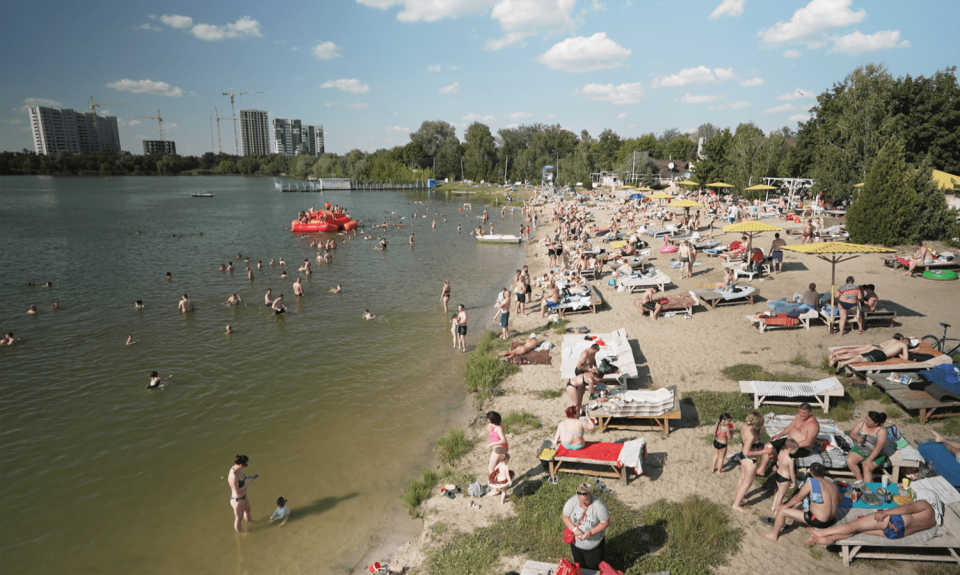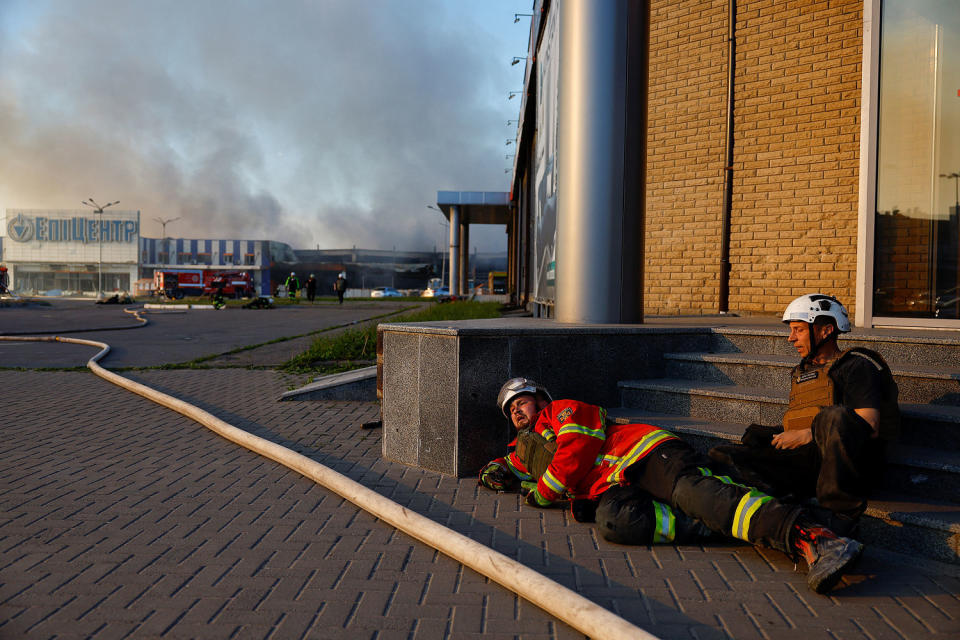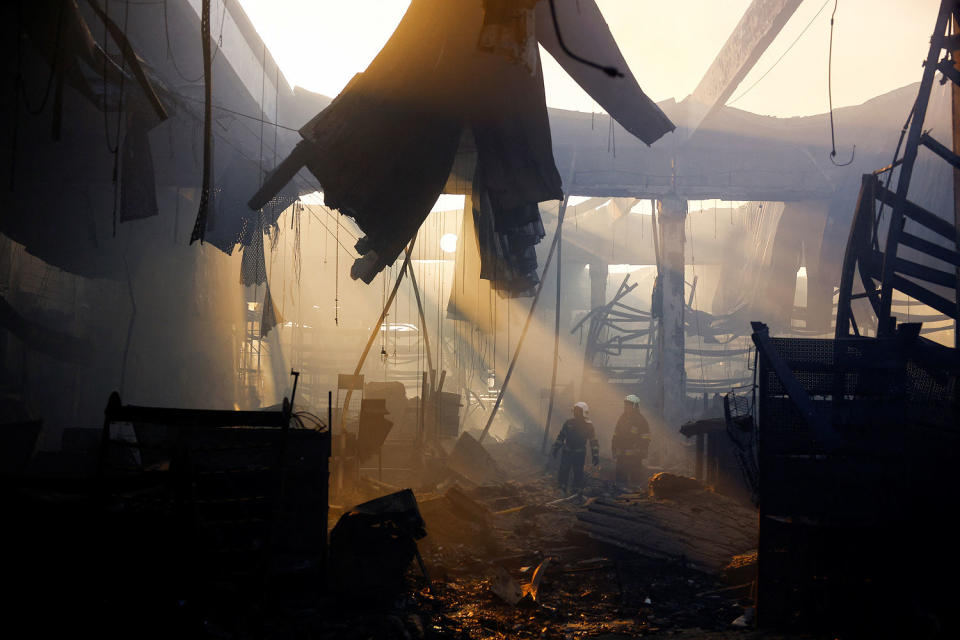KHARKIV, Ukraine — It’s an extremely hot day and hundreds of people are on the sandy shores of the beach that borders the Kharkiv River, drinking cold beer, playing cards or swaying up and down to the music playing in the air. bottom. They seem grateful for the relief of the cold river waters and the relative calm in the sky.
But a few miles from this common summer scene, Ukrainian troops are fighting the Russian army that crossed the border last month in a new offensiveand the distant sounds of falling bombs occasionally pierce the tranquility of the beach.

Kharkiv, Ukraine’s second-largest city, has been attacked by Russian missiles and drones since the early days of the war, and the new Russian offensive appeared to put the city firmly in the Kremlin’s crosshairs. But since a Return of the White House last month allowed the use of American weapons to target Russian territory across the border, officials and residents told NBC News that a period of relative calm had set in.
Some seem to be making the most of it.
“The situation is dangerous every day, but we have to live; we have to distract ourselves from what is happening,” said Oleksandr, 44, a meat seller who was sunbathing on the beach with his daughter, Vasylyna. “It stabilizes us a little psychologically.”
Just 32 kilometers from the Russian border, Moscow’s missiles take seconds to reach Kharkiv. This makes air raid sirens almost redundant. An acute shortage of modern air defense systems has left Ukraine unable to protect the city’s skies, meaning the more than one million people living in the country are particularly vulnerable.
In recent months, Russia has intensified its attacks on the city, with energy and civilian infrastructure taking heavy hits: Cafes, gas stations, printing shops and residential buildings are among the many civilian structures that have been hit. In the latest and one of the deadliest incidents, local authorities said 19 people were killed and dozens were injured on May 25 in a strike at a hardware store.
When the Russians advanced toward Kharkiv last month, Kiev’s European allies and Washington gave the green light to use their weapons for limited attacks inside Russia’s border regions.
Although attacks in Kharkiv and the region have continued, their pace has slowed significantly. And the ground offensive that initially swept through neighboring cities like Vovchansk was contained.
This slowdown has given residents the feeling that, at least for now, the city is safer, according to Oleg Sinegubov, head of the Kharkiv Regional State Administration.


“Thanks, in part, to the U.S. decision to allow the use of weapons inside Russia, it is possible for people to walk the streets,” Sinegubov told NBC News in an interview on the streets of Kharkiv last week. “Things have become calmer here in the city of Kharkiv.”
But it is unclear how long this period of relative calm might last.
When NBC News visited, diners filled bars and restaurants in central Kharkiv, and citizens of all ages could be seen enjoying the city’s parks.
Sirens still ring regularly throughout the city, but seem to provoke little reaction from residents, who continue with their lives. At the same time, the cost of two and a half years of war is evident on every corner: buildings are damaged and mobilization posters are plastered on the walls of central Kharkiv.
“I would say the atmosphere is intense but professional,” said Kharkiv mayor Ihor Terekhov said in an interview last month. “For a lot of people, the ropes are tight, but everyone keeps going.”


Hospitals and public transportation work well, Terekhov said. Many schools have been destroyed but are still teaching online. Some now offer in-person classes in the city’s underground subway stations, he said, so that children are protected from bombings and learning isn’t constantly interrupted by air raid sirens.
Before the war, Kharkiv enjoyed a “special status” in Ukraine, Terehkov said. Known as a convenient city to live in, with a bustling cultural life and clean streets, he explained, it has always been appreciated by the IT sector, young people and students. “It’s always been a young, cool place, a very creative place,” he said.
Hundreds of thousands of residents fled the city after the initial Russian attack in early 2022. But many have since returned, and the city’s population now stands at more than 1 million people, from its pre-war population of approximately 1.4 million. million, said Terekhov.
But rumors have circulated for months that Russia might want to focus on Kharkiv as its next target. A week after launching the offensive, Russian President Vladimir Putin said he had no plans to take the city, but many residents remain nervous.
Several told NBC News they were considering evacuating further to Ukraine if the Russians approached the city, but for now chose to remain where they were. Others said they don’t want to leave the house.


Elena Sukhar, who runs a pharmacy, said she is needed in Kharkiv despite the dangers she faces. On the day she spoke to NBC News last month, 15 missiles hit the city.
Even so, she said there was no panic and that the city continued to function, with beauty salons and even some swimming pools open to the public. “Everything that hasn’t been destroyed and is functional is still open,” said Sukhar, 62. “People wake up, hear the air raid sirens and still go to work.”
Others were more cautious. Housewife Olha Pipko said she rarely ventures out of the house, especially during air raid sirens, which can last for several hours.
“Some people walk around the city as if nothing is happening, but if there is an aerial siren and aviation arriving, we try to stay inside,” said Pipko, 45. But although she noticed a calm after restrictions were loosened in Ukraine, she added that she does not feel safe in the city. “You don’t know if you’re going to wake up in the morning or not,” she said.


This attitude is not unjustified: Russian troops managed to advance closer to Kharkiv at several points in the conflict before being repelled by the Ukrainian army. Still, those living in northeastern Ukraine will have received renewed hope from President Volodymyr Zelenskyy’s statements on Monday, who said Ukrainian forces were “gradually pushing” the Russians out of the Kharkiv region. Vitaly Ganchev, the region’s Russian-appointed governor, told Russian state news agency Ria: “The enemy has withdrawn reserves and is trying to counterattack.”
It’s likely to give city residents a little more peace of mind.
Pipko and others told NBC News they are proud of their city, which they often call “reinforced concrete” — a Ukrainian play on words, which conveys the strength and resilience of the people who live there.
“I like that phrase. Kharkiv is unbreakable,” said Terekhov, the mayor. “We had to take on many tasks and we will have many challenges ahead. Yes, we are reinforced concrete,” he added. “But reinforced concrete also needs protection!”
Richard Engel and Marc Smith were in Kharkiv, Yuliya Talmazan is in London and Daryna Mayer is in Kiev.
This article was originally published in NBCNews. with






































